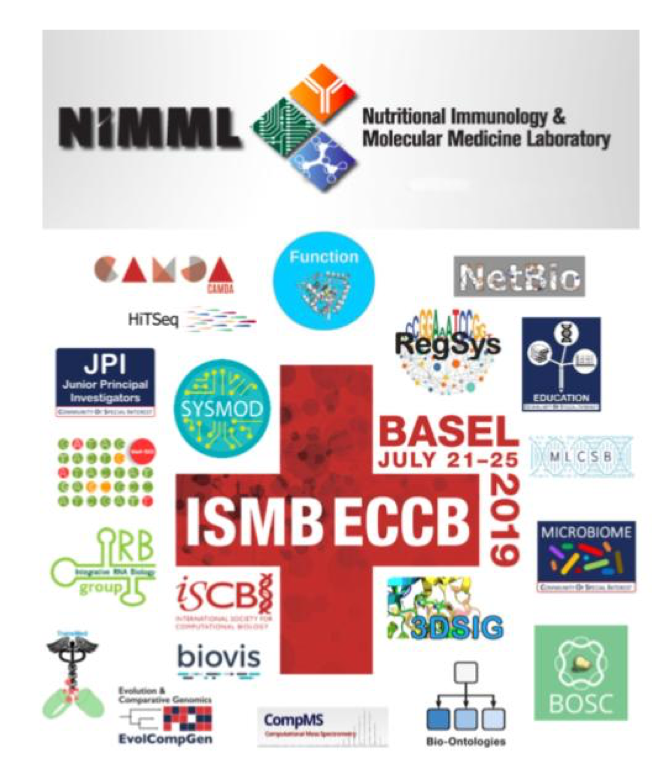NIMML Presents Computational Modeling for Biodefense at the 2019 Intelligent Systems for Molecular Biology Conference

The Nutritional Immunology and Molecular Medicine Laboratory presented its latest research findings on computational modeling for biodefense during the ISMB/ECCB 2019 conference, organized by the International Society for Computational Biology held July 21th-25th in Basel, Switzerland. The objective of the 2019 Intelligent Systems for Molecular Biology (ISMB) conference was to provide a multidisciplinary forum to disseminate the latest developments in the field of computational biology.
NIMML presented the results of a study entitled ‘Advanced Computational Modeling of Immune responses to Clostridium difficile infection’ at the community of special interest (COSI): Computational Modeling of Biological Systems (SysMod). The session focused on the use of mathematical modeling approaches to understand biological systems functions and dysfunctions.
“We are delighted to have presented our advanced computational models platform for biodefense during the ISMB conference. The work funded under the DTRA program is aimed to model the kinetics of host immune response dynamics against toxicogenic bacteria.” Said Dr. Josep Bassaganya-Riera, the Director of NIMML. “Our goal is to build generalizable models of host responses that can be used to accelerate the development of safer, more effective countermeasures against weapons of mass destruction (WMD).” added Dr. Bassaganya-Riera.
“The poster presented an ordinary differential equations (ODE)-based model of the immune response to C. difficile infection and the results from a sensitivity analysis focused on parameters that had negative impact on the development of epithelial lesions following infection. The findings from our analysis highlight the role of ILC3s, IL1 and IL-22 as having a protective effect by reducing the severity of C. difficile infection” said Dr. Raquel Hontecillas, co-PI of the DTRA funded project.
“Our work was accepted for presentation amongst 300 abstracts submitted to the 4th annual SysMod, organized by ISCB. Last year, we presented a study related to building the first hybrid agent based model against Helicobacter pylori infection, recently published in GigaScience at the 3rd annual ISCB SysMod meeting.” Said Meghna Verma, a NIMML PhD student.
The 4th Annual SysMod meeting at ISMB/ECCB 2019 conference was aimed to bridge systems biology and bioinformatics to build comprehensive models of cell, tissues and organisms from high dimensional data. The conference created a forum for systems modelers and bioinformaticians to discuss research questions and methods. The various topics discussed included flux balance analysis, network modeling, logical modeling, AI, and dynamical systems modeling. The sessions included talks related to systems biology of human cells and diseases, microorganisms and highlighted the current trends in systems biology.
Related press releases
Advanced Computational Modeling of the Gut for Biodefense
Artificial Intelligence: The Next Revolution in Healthcare and Precision Medicine
About NIMML
The NIMML Institute is a 501 (c) (3) non-profit public charity foundation focused on a transdisciplinary, team-science approach to precision medicine at the interface of immunology, inflammation, and metabolism. The NIMML Institute team has led numerous large-scale transdisciplinary projects and is dedicated to solving important societal problems by combining the expertise of immunologists, computational biologists, toxicologists, modelers, translational researchers, and molecular biologists. The Institute is headquartered in Blacksburg, VA. For more information, please visit www.nimml.org or contact pio@nimml.org.
